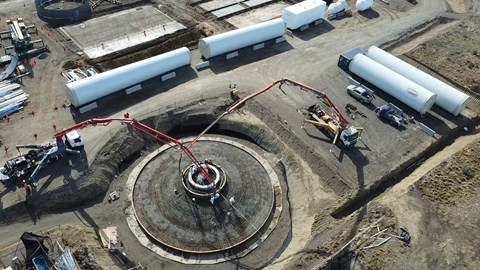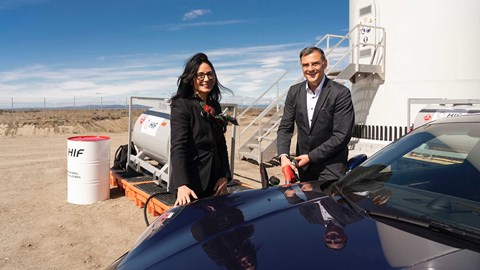► Confirmation from Porsche’s eFuel lead
► Synthetic fuels will hit US forecourts first
► But Porsche has plans for expansion
Porsche’s carbon neutral fuel programme is progressing well. At the 2023 Munich motor show, the brand’s senior project lead for eFuels, Karl Dums, confirmed to CAR magazine that Porsche aims to put its synthetic fuel on sale by the end of the decade.
He said: ‘I believe this can happen within this decade. The fastest track will be in the United States. There are lots of subsidies and this will for sure help to find investors and to find up takers and to have competitive production costs.’
Dums was a little more guarded when quizzed about whether Porsche and HIF could make eFuels commercially competitive against traditional petrol and diesel. He said: ‘a price at the gas station is a complicated thing because you will not pay what it’s worth, but what it’s worth for you.’
He cited issues such as taxes and profits for the oil company. However, taxes for fuel are set according to their CO2 emissions – but because the carbon emissions of eFuels are net zero, Porsche and HIF might be able to dodge that bullet and pass the savings onto consumers. ‘That’s in discussion within the European Union,’ said Dums. ‘But as far as I know it’s not finally decided right now.’
Hold up. Synthetic fuel? Explain yourself
Simple. It’s carbon-neutral fuel made in a lab. The process works like this. Enormous filters suck carbon dioxide out of the air and separate it into its raw elements – carbon and oxygen. At the same time, an electrolysis station (powered by renewable energy, naturally) rips the hydrogen atoms from plain water.
The carbon and hydrogen gathered from these two processes can then be combined in the correct configuration to produce any combustible fuel you want, be it petrol, diesel or even kerosene for the aviation industry. Oxygen is the only waste product from the process and, currently, Porsche simply vents it to atmosphere. In effect, the plant works like a massive artificial tree – and the fuel it creates can be tipped into any compatible combustion vehicle without any modifications to its engine.
Porsche has invested around $100 million in synthetic fuels, $75 million of which was thrown at HIF Global – a technology company with a laser focus on putting eFuels in our local petrol stations. The cash for HIF was used to construct an eFuel production facility in Chile which, by the end of 2022, had produced 130,000 litres of fuel.

Granted, that’s not a lot on a global scale but, once Porsche and HIF start ramping up production, they hope to produce 55 million litres annually by 2025 and 550 million litres by 2027. To prove the efficacy of the technology, Porsche has bought a special batch of eFuel for classic racers which will power an entire grid of pre-1966 911 racers at the 2023 Goodwood Revival. The brand’s chairman, Oliver Blume, has also previously said the 911 will be the last Porsche to electrify.
Despite these huge leaps, Porsche’s efforts are still but a drop in the ocean. The UK consumed more than 13 billion litres of petrol in 2021 alone. So, eFuels won’t be replacing dinosaur juice any time soon – but that was never Porsche’s plan. Porsche is simply trying to prove there’s much more to CO2 reduction than electrification alone. It’s convinced combustion engines running on synthetic fuels also have a role to play, in motorsport, in road cars and in classics, too.
Porsche’s R&D boss, Michael Stiener, explained: ‘The problem is not the internal combustion engine itself, it’s the fuel you burn. We have to do a lot of work in order to come down on CO2 emissions, definitely, and we are totally committed to this. But the problem is not the engine itself.

‘We would like to show that e-fuels are a feasible technology with certain volumes – there are a lot of questions, and people who are not convinced that this will work. So, we have to show them. The decision is not one to be taken by our side alone, of course, but we will do all we can to see if this is a solution for highly emotional cars, for racing, and also for on road cars. Our job, at least as research and development, is to show what’s technically possible. The next step is to convince people that there might be not the need to ban everything.
‘We think there could be applications for e-fuels in motorsports, in vehicle testing [and] in our Porsche experience centres. With e-fuels, Porsche classic cars and hybrid models could drive in the future almost neutrally, and current sports cars like the 911 […] could drive almost CO2-neutrally in the future thanks to e-fuels.’
What are the advantages of eFuels?
If eFuel takes off, drivers wouldn’t need to trade in their petrol and diesel cars for EVs. Electric cars are expensive to buy thanks in part to the rare earth materials used in their electric motors and battery packs. That means its harder for those on low incomes to cut their motoring carbon emissions. However, eFuels would mean that an old Ford Fiesta could tread as lightly on the planet as a brand-new Tesla, providing the fuel was made using 100 per cent renewable energy.
Governments also wouldn’t need to spend thousands on expanding their EV charging infrastructure. With eFuels, all that would change would be the liquid in the tanker being delivered to your local Esso. The petrol station pumps, storage containers and payment methods would all remain identical, making it a plug-and-play solution to cutting our CO2 emissions.
One of Porsche’s main benefits for the technology is that it’ll allow car enthusiasts to enjoy their hobby guilt-free. Automotive marketeers have cheapened the image of the petrol engine to benefit their hybrid and electric cars. The shift in rhetoric has encouraged more drivers to buy EVs which, in turn, helps to keep their average fleet CO2 output low enough to avoid government emissions tariffs.

We understand the reasoning. Manufacturers would be forced to pass the high CO2 tariffs imposed by current legislation on to consumers in the form of higher retail prices, which would force buyers away from their cars. If that legislation could be changed to account for the CO2 neutrality of eFuels, we could see fresh investment in petrol cars. Even if it’s just the fast, expensive stuff.
We’ve seen some resistance to electrification from consumers in the past two months alone. In the July byelections, Labour lost the key strongholds of Uxbridge and South Ruislip. Political campaigners on both sides of the Commons attributed the defeat to London’s expanded Ultra Low Emission Zone, which was rolled out by the Labour mayor Sadiq Khan, despite criticism from residents. The decision led the Tory government to take a non-committal stance on the 2030 petrol and diesel ban.
Who knows – if companies as powerful as Porsche are prepared to stick their necks out for us, we might yet be able retain the convenience of combustion engined cars while also nurturing a new generation of petrolheads in the process. We’re hopeful.